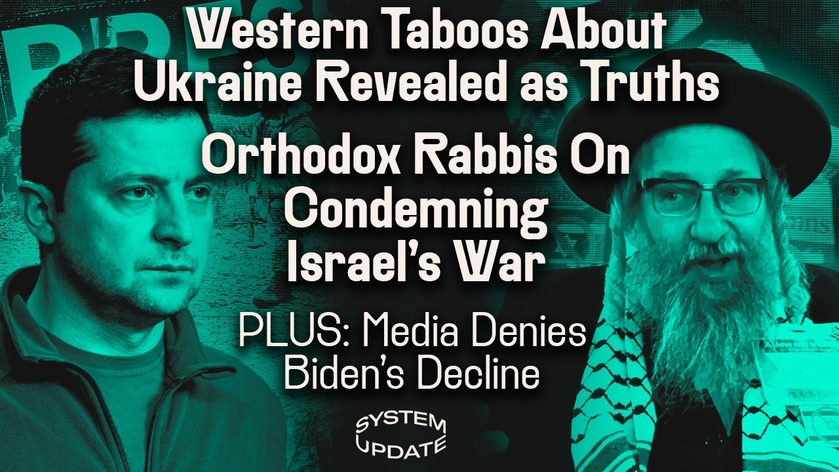Watch the full episode HERE
Good evening. It's Tuesday, June 18.
Tonight: ever since Russian troops entered Ukraine in February of 2022, it has been essentially taboo in Western media to express any criticisms toward Ukraine or its president, Volodymyr Zelenskyy. It was equally taboo to point out the reasons Ukraine had so little chance to win the war against Russia, and the sense of how victory was defined, namely expelling all Russian troops from every inch of Ukrainian soil, including even Crimea. It mattered little – in fact, not at all – whether any of those statements were true or false. Worse than false, they were banned and declared off limits, and the price for uttering them was not only marginalization from mainstream media discourse but also official attacks on your character that usually included formal accusations that one was a Russian agent or a Kremlin propagandist.
The truth is sometimes too clear and visible to hide under waves of propaganda and threats of reputational destruction. Slowly but surely, the Western media has finally begun acknowledging the obvious that Ukraine is losing this war, that it has major problems manning its weakening front lines and that more and more Ukrainians are refusing, often with violence, to be used as cannon fodder by being conscripted and sent to the front line. And perhaps worst of all, Ukraine under President Zelenskyy is very far away from the noble democracy we were told we were fighting for. If anything, Zelenskyy is a classic authoritarian and wannabe tyrant who exhibited those traits even before the Russian invasion and is now accelerating them, as all authoritarians do, by using this war as his excuse.
It is truly bizarre, yet deeply illuminating to watch how shamelessly media discourse switches overnight when facts force them to do so. What was prohibited as Russian propaganda, as recently as six months ago, is now suddenly widely acknowledged by Western media outlets. Over the past week in particular, there have been at least three major articles by once-blindly-loyal-pro-Ukrainian media outlets that show just how grim is the situation for Ukraine and how deeply and deliberately Western citizens have been deceived about this war that they have been convinced to pay for and to arm without end.
Then: screaming “racist” or “bigot” at those who disagree with us has been a common staple of American political discourse for some time now. We have seen over and over how this lowly rhetorical tactic was weaponized against right-wing thought. Since October 7, it has been endlessly used by pro-Israel loyalists against those who criticize the Israeli and American role in the war in Gaza. Indeed, it is not an exaggeration to say that the functional effective definition of antisemitism is “one who criticizes or opposes Israeli actions in general and its war in Gaza specifically.” That is really what is meant when someone calls another person an anti-Semite. There is virtually nobody who has expressed opposition to the Israeli war, who has not been publicly branded “antisemitic” at some point. There are so many strange and disturbing aspects to this discourse. Chief among them is that there are a non-trivial number of Jews – a very significant and vocal contingent both inside Israel and outside of it – who have been very vocal in their condemnation of Israel's war in Gaza and their mistreatment of Palestinians in general.
Just as liberals often vilify black people or gay people as “self-hating” if they refuse to vote Democrat – President Biden, for example, famously pronounced, “If you don't know that you're voting for me yet, then you ain't black” – it's extremely strange to label a viewpoint as antisemitic when a significant majority of Jewish people share that very view that is being maligned that way.
Among those who share the view that the Israeli war in Gaza is unjust are two Orthodox rabbis, Yisrael David Weiss and Rabbi David Feldman, who believe that the Israeli war is not only wrong but a violation of core Jewish religious values and principles. We will speak to them tonight so that you can hear their not-very-often-heard perspective.
Before we get to that: several weeks ago, I traveled to Maine, where Tucker Carlson spends much of the year, and that is where he broadcasts from and has his podcast. I sat down with him for over two hours to discuss a wide range of topics, many of which we cover on the show frequently including the issue of free speech and the right-wing hypocrisy on censorship since October 7, the bipartisan war Machine, the war in Ukraine, the attempts to imprison whistleblowers and people who bring the truth like Julian Assange and Edward Snowden, as well as the Israeli war in Gaza and a whole variety of other issues.

The funny part about this is I sat down at that table with Tucker and began what I thought was just chatting with him while we waited for the show to start. And in fact, the show had already started, and it took me 9.5 minutes to ask him because he was becoming very formal in his questions, about whether we had already started. And then he suddenly said, yeah, we've been rolling from the beginning. And I said, okay, that's fine. So, it was interesting to go back and look at that because I really had no idea that we were rolling. I thought we were just talking privately, but I think the whole conversation is really worth hearing. These are, as I said, topics that are often covered on this show, but they got covered differently because of the exchange between myself and Tucker, because of the format that allowed for very deep dives into a lot of these topics. You can find that podcast on any of Tucker Carlson’s network feeds, including on his own site, on YouTube, and wherever else that podcast is found.
For now, welcome to a new episode of System Update, starting right now.






















